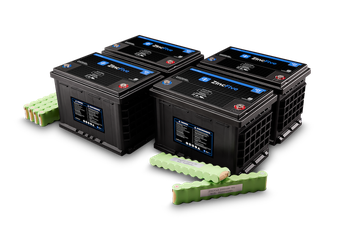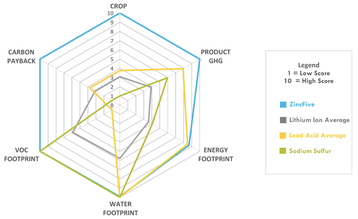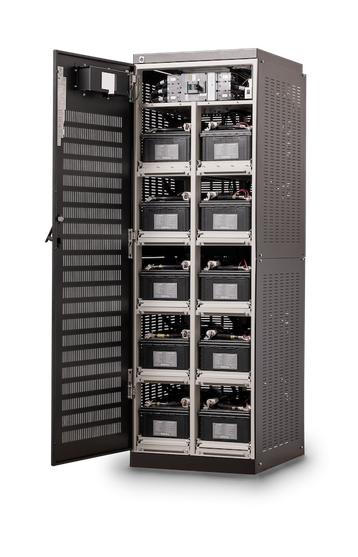Data centers contain all the information on which internet activities rely, forming the bedrock supporting our increasingly connected world. As a result, any data center power outage – no matter how short – can have a catastrophic impact on operations around the globe. That’s why reliable backup power matters so much.
But while data center operators need to meet this challenge of reliability, it’s far from the only factor they must consider. Data centers are also under pressure to manage costs, meet sustainability goals, and reduce space – especially as facilities increasingly move to urban environments.
Fortunately, there’s a way to address all these challenges at once. Switching out lead-acid and lithium-ion backup batteries for nickel-zinc batteries increases reliability, safety, and sustainability while simultaneously lowering costs and space requirements.
Nickel-zinc batteries’ crucial role in data center reliability
Since even a few seconds of data center downtime can disrupt operations around the world, uninterruptible power supply (UPS) systems are essential to maintain uptime during a power outage.
Unfortunately, the very system meant to prevent an outage too often causes one; accounting for 37 percent of data center outages, on-site power failure is still the most common cause of significant data center outages. The majority of these on-site outages (53 percent) are caused by UPS failure, and often cost over $100,000 to repair.
Thus, UPS systems must contain backup batteries that perform reliably under any circumstances. UPS batteries must perform in paralleled strings to provide adequate power and run time to the UPS in the event of an outage. If any single cell in one of these batteries fails, the battery string does not operate, making the data center’s UPS unable to supply enough power and/or run time when an outage occurs.
However, cells in nickel-zinc batteries remain conductive even if weakened or depleted. This allows the battery string to continue operating and makes what would otherwise be an emergency into a simple note for replacement at the next planned maintenance cycle – no added maintenance costs or operational impact.
In the meantime, the data center’s UPS can still provide adequate power and run time to the data center if an outage occurs. This characteristic makes nickel-zinc batteries a strong option on the market for maintaining uptime and preventing costly outages.
Also, battery reliability can only last as long as the battery itself. With a 10-15 year operating life, nickel-zinc batteries have at least twice the lifespan of lead-acid batteries and one similar to lithium batteries. For example, ZincFive’s nickel-zinc batteries are designed to have a lifespan of 15 years and come with a ten-year warranty.
Nickel-zinc: More space, more profits
In addition to being more reliable, nickel-zinc batteries are also more power-dense than either lithium or lead batteries. Over a short time frame, they can discharge over twice the power that leading lithium-ion batteries would provide.
This makes them the ideal option for a data center UPS, whose goal is to keep the entire data center running temporarily until utility power returns or backup generators take on the power load.
Because of the power density of nickel-zinc batteries, fewer battery cabinets are required to support large UPS solutions. A mere four ZincFive battery cabinets provide an equivalent runtime at a megawatt of UPS as five lithium-ion cabinets or six lead-acid cabinets.
This frees up room in the data center for more revenue-generating hardware such as servers and storage, increasing the center’s profits as well as its reliability. In addition, the spacing requirements required by the NFPA for other chemistries is not required for chemistries that are inherently non-flammable like nickel-zinc.
Nickel-zinc helps sustainability & ESG goals
Organizations are under pressure – and are increasing pressure on their data centers – to report and reduce their impact on the environment. Boundless Impact Research and Analytics carried out a Climate Impact Profile comparing the environmental impact of different backup battery chemistries, providing excellent information for data centers and their customers as they report Scope 3 emissions.
This profile revealed nickel-zinc batteries’ significantly lower impact on the environment across all six metrics of a battery life cycle analysis: carbon return on purchase (CROP), greenhouse gas (GHG) emissions, carbon payback time (CPT), volatile organic compounds (VOCs), water footprint, and energy footprint.
From the beginning of their lifecycle, nickel and zinc production are less harmful than lithium and lead production. They are respectively four and five times more abundant in the earth’s crust, and don’t require as environmentally harmful a mining process.
Nickel-zinc batteries’ life cycle GHG emissions are four times lower than lead-acid batteries’, and six times lower than lithium-ion batteries’. Their carbon payback time – the time required for emissions savings from the product’s use to offset the GHG from its production – is a mere 25 percent of lithium-ion and lead-acid batteries’ payback time.
In addition, both lead and lithium batteries use VOC’s (volatile organic compounds) in their production. These cause both short and long-term health problems, in addition to those caused by accidental lead exposure. In contrast, nickel-zinc batteries contain no VOC’s or other toxic elements. They can be used and recycled without dangerous exposure.
The Climate Impact Profile also reveals that over their lifetime, nickel-zinc batteries use 96 percent less water than lithium batteries and about 22-33 percent less energy than lithium and lead-acid batteries.
Put together, these environmentally friendly characteristics give nickel-zinc batteries the highest score for sustainability: 9.4 out of 10. That’s why sustainable data center Wyoming Hyperscale White Box chose ZincFive’s nickel-zinc batteries for its UPS needs.
Safer data centers with nickel-zinc
In terms of safety, nickel-zinc technology has clear advantages over lead-acid and lithium-ion batteries. Unlike nickel-zinc, both of the latter include harmful VOC’s in their production and contain toxic chemicals that make handling and recycling them difficult.
Nickel-zinc batteries are non-toxic, nonflammable, and fail-safe. They do not exhibit thermal runaway, as proven through testing ZincFive’s batteries using the Underwriters Laboratories UL 9540A test method, and can withstand higher temperatures than lithium-ion. This makes them easier and safer to handle and ship, as well as guaranteeing more reliable performance.
ZincFive battery cabinets: An easy drop-in replacement
While nickel-zinc batteries’ characteristics give data centers more than enough reason to make the switch from lead-acid, one challenge often stands in the way – but with ZincFive’s BC Series UPS Battery Cabinets, it doesn’t have to.
The challenge comes from the large installed base of UPS systems designed to charge only lead-acid batteries. Since every battery chemistry has a different charge profile, getting most alternative battery types to charge in those UPS systems requires a costly and time-consuming reengineering process.
However, ZincFive’s battery cabinets negate this obstacle; it is the first BESS that allows nickel-zinc batteries to perform in an existing UPS system without the time and expense of additional modifications.
The battery cabinet's intelligent charging system utilizes the existing lead-acid charging profile to fully charge the nickel-zinc battery, giving them backwards/forwards compatibility with systems originally designed for lead-acid solutions. This drop-in replacement allows data centers to easily harness the benefits of ZincFive’s nickel-zinc batteries.
‘The Power of Good Chemistry’: A reliable, sustainable, safe UPS energy storage system
When lithium-ion entered the data center market, its performance triggered a migration away from its lead-acid counterparts.
But as lithium-ion’s safety, reliability, and sustainability issues surface, nickel-zinc chemistry has proven ideal to solve those concerns while delivering an even smaller footprint. Nickel-zinc battery-powered technology offers high performance, market success, and many proven improvements on previous backup technologies.
When it comes to your relationship with the batteries in your facility, never underestimate ‘The Power of Good Chemistry.’
More from ZincFive
-

Corscale to use ZincFive nickel-zinc batteries at Northern Virginia data center campus
Second company to deploy the nickel-zinc UPS this year
-

Nickel-zinc batteries can reduce Scope 3 emissions
Battery chemistry can belp you report better and cut your footprint
-

Battery charge: Why nickel-zinc batteries are challenging lead-acid and Lithium-ion
While lead-acid is the established UPS battery technology and Li-ion is more energy dense, nickel-zinc is a better all-round technology, says ZincFive’s Aaron Schott



